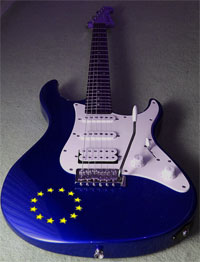 The European Commission announced yesterday that it wants to give a boot up the backside of the European market for online music services by making it easier for new providers to get licences to flog songs over the Internet.
The European Commission announced yesterday that it wants to give a boot up the backside of the European market for online music services by making it easier for new providers to get licences to flog songs over the Internet.
If all goes to plan, it will get rid of pesky restrictions which prevent bargain-hunting Belgium’s and hussling Hungarians from buying cheapo downloads elsewhere due to current laws stopping companies offering EU-wide services.
Clipboard-toting investigators from the EC identified the hassle that companies face in getting licences to offer music across the whole of Europe, as the main obstacle to the growth of legal online music services.
Presently, online music providers have to laboriously apply for licences in each and every one of the 25 member EU states, and then deal individually with collecting societies charged with securing royalties for artists and music firms.
We’ve covered this before back in May and November last year, originally when the EU challenge EU-wide music royalty structure and latterly when the European Music Rights hearings were on.
Internal market commissioner Charlie MacCreevy said: “The absence of pan-European copyright licences made it difficult for the new European-based services to take off. This is why we are proposing the creation of Europe-wide copyright clearance.”
The European Commission’s study argues that entirely new structures for cross-border management of copyrights were needed, concluding that this could be best achieved by letting artists and content providers to choose a collecting society to manage their copyrighted work across the whole of the EU.
With the Commission cheesed off with collecting societies basking in actual or effective monopolies in many EU member states, the new measures would increase earnings for copyright holders by lowering administrative costs and allowing the most efficient societies to compete for artists.
A proposal from the Commission aimed at abolishing the current situation where copyright holders are compelled to register with their national collecting society is expected in the third quarter.
Lucy Cronin, executive director of the European Digital Media Association (EDIMA) was as pleased as Punch with the initiative: “After years of toil, we’re pleased that the Commission has recognised the problem in the online music licensing regime.”
“The current system, based on national licensing and collecting societies, is no longer appropriate for digital services” she added.
Cronin felt that this new legislation could also benefit consumers, with an increase in pan-European licences increasing the amount of downloadable music available, as copyright holders look to exploit larger markets.
With the IT industry arguing that sales have been held back by the lack of a simple, one-stop online licensing system, online music sales in Europe remain miserably small compared to our American cousins – €28m (~£19,1m, $33.3m compared to the whopping great €207m (~£142m, ~$246m) US trade.
European Union
 Mobile phone networks in London were overwhelmed for several hours following a series of terrorist blasts across central London.
Mobile phone networks in London were overwhelmed for several hours following a series of terrorist blasts across central London. As with 9/11, many people turned to the Web for news and updates, resulting in major news sites struggling with the enormous surge in traffic.
As with 9/11, many people turned to the Web for news and updates, resulting in major news sites struggling with the enormous surge in traffic. PodGear PockParty
PodGear PockParty Is this something to buy? It’s VERY convenient as it’s so small and does easily fit in your pocket (as the name suggests) and it can be heard by a a group of people in the right surroundings.
Is this something to buy? It’s VERY convenient as it’s so small and does easily fit in your pocket (as the name suggests) and it can be heard by a a group of people in the right surroundings.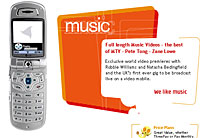 Consumer demand for mobile downloads is going bonkers, according to research by LogicaCMG.
Consumer demand for mobile downloads is going bonkers, according to research by LogicaCMG. Globally, subscribers just lurve downloading ring tones, games and music, with news and sports also gaining a growing audience in Europe.
Globally, subscribers just lurve downloading ring tones, games and music, with news and sports also gaining a growing audience in Europe.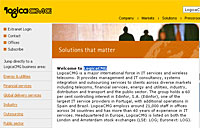 Mobile phone users are starting to experiment with their phones’ capabilities but, drawing a parallel with the popular SMS experience, it is clear that the service needs to be simple, safe and intuitive from initial browsing through to payment and download.
Mobile phone users are starting to experiment with their phones’ capabilities but, drawing a parallel with the popular SMS experience, it is clear that the service needs to be simple, safe and intuitive from initial browsing through to payment and download. US police have arrested a Florida man for gaining illegal access on a domestic wireless Internet network.
US police have arrested a Florida man for gaining illegal access on a domestic wireless Internet network. There’s not much harm in that, but the newspaper report points out the darker side of Wi-Fi pilfering, with criminals using the unsecured networks to traffic in child pornography, steal credit card information and even send death threats.
There’s not much harm in that, but the newspaper report points out the darker side of Wi-Fi pilfering, with criminals using the unsecured networks to traffic in child pornography, steal credit card information and even send death threats.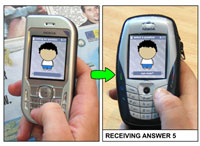 Dysfunctional drunks, lurking loners and nervous nerds need no longer feel alone thanks to a new mobile phone guessing game called YOU-WHO.
Dysfunctional drunks, lurking loners and nervous nerds need no longer feel alone thanks to a new mobile phone guessing game called YOU-WHO.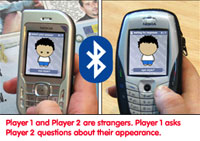 Once a set number of clues have been given, the players’ phones ‘call’ to each other with a distinctive sound, thus revealing both players’ locations and identities, quickly followed by screams of “Aaaargh!” Get away from me you weird freakshow nerd!”
Once a set number of clues have been given, the players’ phones ‘call’ to each other with a distinctive sound, thus revealing both players’ locations and identities, quickly followed by screams of “Aaaargh!” Get away from me you weird freakshow nerd!”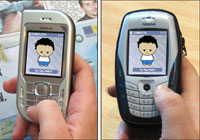 You-WHO is offered as a free 28 day time-limited demo. The cheery young developers at AgeO+ hope to have a full commercial release soon.
You-WHO is offered as a free 28 day time-limited demo. The cheery young developers at AgeO+ hope to have a full commercial release soon. Buying goods with your PC may soon be as hip as dancing to a Chris De Burgh remix if the latest innovation from Yahoo Japan takes off.
Buying goods with your PC may soon be as hip as dancing to a Chris De Burgh remix if the latest innovation from Yahoo Japan takes off. It can be a confusing life for protesters keen to voice their opinions at the G8 meeting in Gleneagles.
It can be a confusing life for protesters keen to voice their opinions at the G8 meeting in Gleneagles.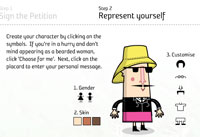
 All those signing up will have their names added to the online petition, the Live 8 list, which is being sent directly to the G8 leaders.
All those signing up will have their names added to the online petition, the Live 8 list, which is being sent directly to the G8 leaders.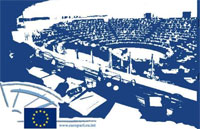 The European Parliament has voted overwhelming against a controversial bill that might have led to software being patented.
The European Parliament has voted overwhelming against a controversial bill that might have led to software being patented.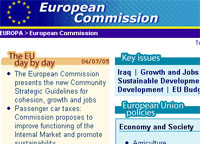 The bill was supposed to get rid of individual EU nations’ patent dispute systems and replace it with a common EU procedure. Instead, the old system of patents being handled by national patent offices will continue, without any judiciary control by the European Court of Justice.
The bill was supposed to get rid of individual EU nations’ patent dispute systems and replace it with a common EU procedure. Instead, the old system of patents being handled by national patent offices will continue, without any judiciary control by the European Court of Justice. A report in German news magazine Focus states that the German Federal Ministry of Transport, Building and Housing will be lifting its ban on the use of mobile phones on commercial flights.
A report in German news magazine Focus states that the German Federal Ministry of Transport, Building and Housing will be lifting its ban on the use of mobile phones on commercial flights. The technology for providing in-flight GSM coverage is already in place, with Swedish vendor Ericsson recently announcing a newly developed ‘GSM on Aircraft’ system.
The technology for providing in-flight GSM coverage is already in place, with Swedish vendor Ericsson recently announcing a newly developed ‘GSM on Aircraft’ system.